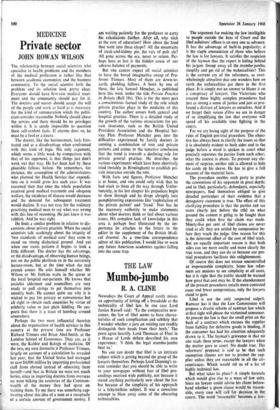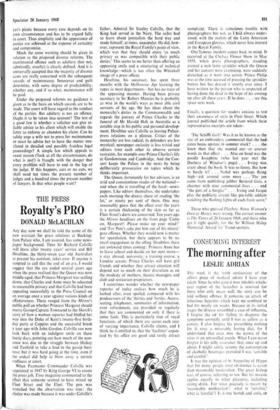Mumbo-jumbo
THE LAW R. A. CLINE
Nowadays the Court of Appeal rarely misses an opportunity of letting off a broadside at the technicality of libel law. In one case Lord Justice Russell said: `To the comparative new- comer, the law of libel seems to have charac- teristics of such complication and subtlety that I wonder whether a jury on retiring can readily distinguish their heads from their heels.' The press agree heartily. Lord Thomson of Fleet in a House of Lords debate described his own experience: 'I think the legal mumbo-jumbo beat us.'
No one can doubt that libel is an intricate subject which is getting beyond the grasp of the lawyers themselves. Perhaps Lord Denning's re- cent reminder that you should be able to write to your newspaper without fear of libel pro- ceedings received wide publicity, not because it stated anything particularly new about the law but because of the simplicity of his approach to a labyrinthine subject. It was a conscious attempt to blow away some of the obscuring technicalities. The argument for making the law intelligible to people outside the Inns of Court and the libel solicitors' offices is an easy one to advance. It has the advantage of built-in popularity; it is the staple ammunition of those who believe the law is for lawyers. It satisfies the suspicion of the layman that the expert is hiding behind his jargon. Sweep away all the mumbo-jumbo, simplify and get rid of the technicalities! This is the current cry of the reformers, so over- whelmingly attractive that one wonders how on earth the technicalities got there in the first place. It is simply not an answer to blame it on a conspiracy of lawyers. The Victorians who created these highly complex procedures had just as strong a sense of justice and just as pro- found a distrust of lawyers as ourselves. And if we forget their raison d'être we are in danger of so simplifying the law that everyone will spend all his available time fighting in the courts.
For we are losing sight of the purpose of the rules of English pre-trial procedure. The objec- tive has always been to clarify the issues so that it is absolutely evident to both sides and to the judge before a word is spoken in court what precisely separates the parties from each other; what the contest is about. To prevent any ele- ment of surprise, neither side is allowed to hide his cards up his sleeve. He has to give a full account of the material facts.
The procedure enables each party to probe the contentions of his opponent in great depth; and in libel, particularly, defendants, especially newspapers, find themselves obliged to give detailed particulars of their evidence that a derogatory statement is true. The effect of this clarifying procedure is that the parties can see more clearly just before the trtal on *hat ground the contest is going to be fought than they could when first the claim was made. Ninety-five per cent of libel claims are never tried at all; they are settled by compromise be- fore they reach the judge. One reason for this is the deterrent effect of the cost of libel trials. But an equally important reason is that both sides can see more coolly and more clearly the true issue, and they can do so because our pre- trial procedures facilitate this enlightenment.
Of course this does not excuse uncontrolled or impenetrable complexity. Some law refor- mers are anxious to see simplicity at all costs, but it is right that the public should be warned how great that cost may be. If the abandonment of the present procedures entails more contested cases and fewer compromises, only the lawyers stand to gain.
Libel is not the only suspected culprit. Rumour has it that the Law Commission will propose a drastic reform of contract law which at first sight will please the victimised consumer. At present the law is that the small print on the back of a contract which excuses the supplier from liability for defective goods is binding, if the consumer has had his attention adequately drawn to it. The layman's grievance is that no one reads these terms, except the lawyers when the matter goes to court. No doubt true. The reformers' proposal is said to be that such exemption clauses are not to protect the sup- plier unless they are reasonable in all the cir- cumstances. Which would rid us of a lot of highly technical law. But what takes its place? A simple formula which would give rise to a mass of law suits. Since no lawyer could advise his client before- hand whether a given clause would be reason- able, every case will call for decision in the courts. The word 'reasonable' becomes a law- yer's picnic because every case depends on its own circumstances and has to be argued fully in court. Thus simplicity and the appearance of justice are achieved at the expense of certainty" and compromise.
Much the same warning should be given in relation to the proposed divorce reforms. The matrimonial offence such as adultery. (but not, admittedly, cruelty) is clearly defined. And it is universally accepted that the majority of divorce cases are really concerned with the subsequent awards of maintenance. Innocence and guilt determine, with some degree of predictability, whether any, and if so what, maintenance will be paid.
Under the proposed reforms no guidance is given as to the basis on which awards are to be made. The court will have regard to the conduct of the parties. But adultery is not an offence. Ought. it to be taken into account? The test of a good law is whether- a solicitor can give re- liable advice to his client which will enable the latter to enforce or abandon his claim. Can he safely urge a wife not to press for maintenance or must he advise her to have the matter ven- tilated in detailed and possibly fruitless legal proceedings? A simple law which appeals to sweet reason (gook at all the circumstances, do what is just') is fraught with the danger that every problem will have to end in the lap of the judge: If this happens, cuts or no cuts, we shall need ten times the present number of judges and a hundred times the present number of lawyers. Is that what people want?



































 Previous page
Previous page